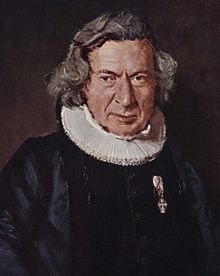
Andreas Gottlob Rudelbach (29 September 1792 - 3 March 1862) was a Dano-German neo-Lutheran theologian. [1]

Andreas Gottlob Rudelbach (29 September 1792 - 3 March 1862) was a Dano-German neo-Lutheran theologian. [1]
He was born at Copenhagen; died at Slagelse, Zealand. He was educated the Metropolitanskolen and attended the University of Copenhagen, where he received the academic title privatdozent . During this period in collaboration with N. F. S. Grundtvig, he edited the Theologisk Maanedskrift (13 vols., 1825 sqq.) In 1829 he was called to the pastorate of Glauchau, Saxony, where he aided religious awakening and revolt against the rationalism of the period, though at the same time he opposed any formal separation from the Lutheran Church. In 1830 he aided in founding the Muldenthal pastoral conference, but opposition gradually developed against him, largely based on the issued of his uncompromising Lutheranism dogma. In 1845 he resigned his pastorate and returned to Denmark. From 1846 to 1848 he lectured at the University of Copenhagen on Dogmatic theology, but the death of his royal patron in the latter year exposed him to the attacks. He accordingly accepted a call to the pastorate of Slagelse in 1848. [2]
He edited the Zeitschrift für die gesammte lutherische Theologie und Kirche (in collaboration with H. E. F. Guericke, Leipzig, 1839 sqq.) and Christliche Biographie, i (1849), and wrote, in addition to the works already mentioned and several volumes of sermons: Hieronymus Savonarola und seine Zeit (Hamburg, 1835); Reformation, Luthertum und Union (Leipzig, 1839); Historische-kritische Einleitung in die Augsburgische Konfession (Dresden, 1841); Amtliches Gutachten über die Wiedereinführung der Katechismus-Examina im Königreich Sachsen, nebst historischer Erörterung der Kathechismus-Anstalten in der evangelisch-lutherischen Kirche Deutschlands (1841); and Om Psalme-Literaturen og Psalmebogs-Sagen, historisk-kritiske Undersögelser (Copenhagen, 1856).
Karl Rudolf Hagenbach was a Swiss church theologian and historian. He was particularly interested in the Protestant Reformation and its figures.

Theodosius Andreas Harnack was a Baltic German theologian.

Theodor Fliedner was a German Lutheran minister and founder of Lutheran deaconess training. In 1836, he founded Kaiserswerther Diakonie, a hospital and deaconess training center. Together with his wives Friederike Münster and Caroline Bertheau, he is regarded as the renewer of the apostolic deaconess ministry. His work in nursing was pioneering for Florence Nightingale, who spent a few months in Kaiserswerth in 1850.

Karl Friedrich August Kahnis was a German Neo-Lutheran theologian.

Ernst Adolf Alfred Oskar Adalbert von Dobschütz was a German theologian, textual critic, author of numerous books and professor at the University of Halle, the University of Breslau, and the University of Strasbourg. He also lectured in the United States and Sweden.

August Friedrich Christian Vilmar, German Neo-Lutheran theologian; born at Solz November 21, 1800; died at Marburg July 30, 1868.
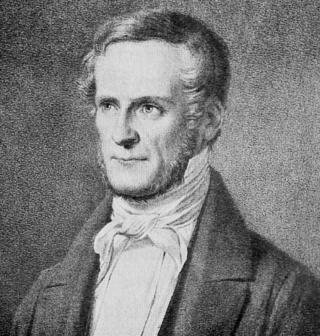
Theodor Friedrich Dethlof Kliefoth was a German Neo-Lutheran. He was born in Körchow, Mecklenburg-Schwerin on 18 January 1810 and he died in Schwerin on 26 January 1895.
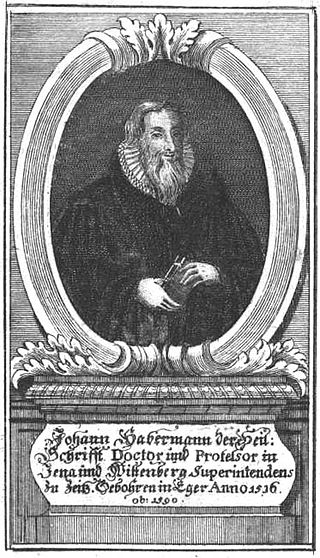
Johann Habermann, also Johannes Avenarius was a German Lutheran theologian.
Oscar Leopold von Gebhardt was a German Lutheran theologian, born in the Baltic German settlement of Wesenberg in the Russian Empire.

Johannes Andreas August Grabau was an influential German-American Old Lutheran pastor and theologian. He is usually mentioned as J. A. A. Grabau.

Carl Paul Caspari was a Norwegian neo-Lutheran theologian and academic. He was a Professor of Old Testament Theology at the University of Oslo. He wrote several books and is best known for his interpretations and translation of the Old Testament.

Petri, Ludwig Adolf was a German Neo-Lutheran clergyman.

Franz Mone was a historian and archaeologist.
Ecclesiastical history of the Catholic Church refers to the history of the Catholic Church as an institution, written from a particular perspective. There is a traditional approach to such historiography. The generally identified starting point is Eusebius of Caesarea, and his work Church History.

Gustav Adolf Wislicenus was a German theologian, one of the leaders of the Free Congregations.

Johann Hinrich Wichern was a founder of the Home Mission movement in Germany.

Johann Konrad Wilhelm Löhe was a pastor of the Lutheran Church, Confesional Lutheran writer, and is often regarded as being a founder of the deaconess movement in Lutheranism and a founding sponsor of the Lutheran Church–Missouri Synod (LCMS). From the small town of Neuendettelsau, he sent pastors to North America, Australia, New Guinea, Brazil, and Ukraine. His work for a clear confessional basis within the Bavarian church sometimes led to conflict with the ecclesiastical bureaucracy. His chief concern was that a parish find its life in the eucharist, and from that source evangelism and social ministries would flow. Many Lutheran congregations in Michigan, Ohio, and Iowa were either founded or influenced by missionaries sent by Löhe. He is commemorated on 2 January by the calendars of both the LCMS and the Evangelical Lutheran Church in America.

Gottfried Vopelius, was a German Lutheran academic and hymn-writer, mainly active in Leipzig. He was born in Herwigsdorf, now a district of Rosenbach, Oberlausitz, and died in Leipzig at the age of 70.
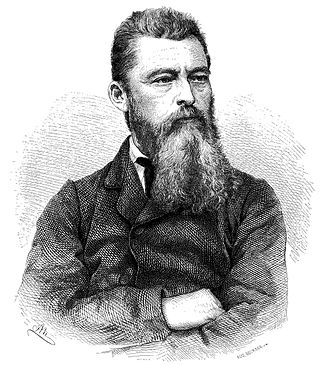
Ludwig Andreas von Feuerbach was a German anthropologist and philosopher, best known for his book The Essence of Christianity, which provided a critique of Christianity that strongly influenced generations of later thinkers, including Charles Darwin, Karl Marx, Sigmund Freud, Friedrich Engels, Richard Wagner, and Friedrich Nietzsche.
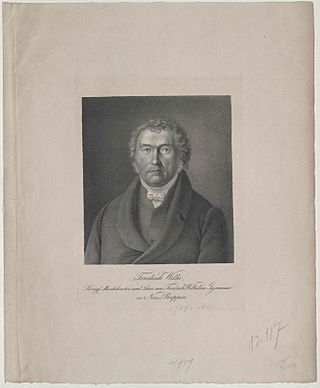
Christian Friedrich Gottlob Wilke was a German organist, composer, music teacher, music writer and organ revisor.
{{cite encyclopedia}}: Missing or empty |title= (help)